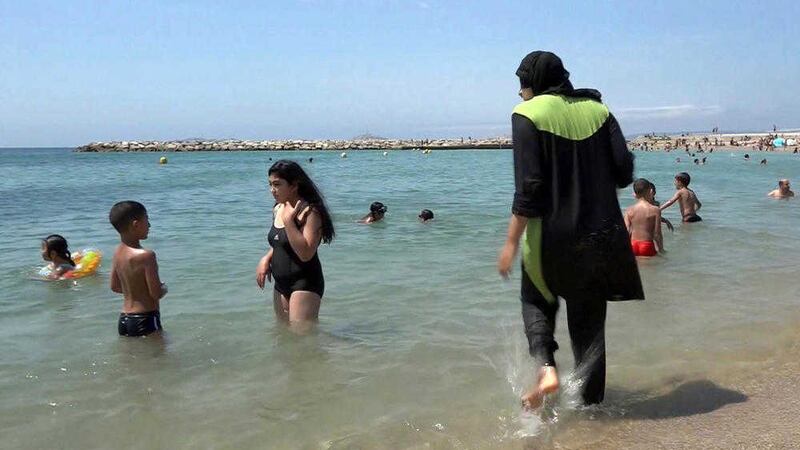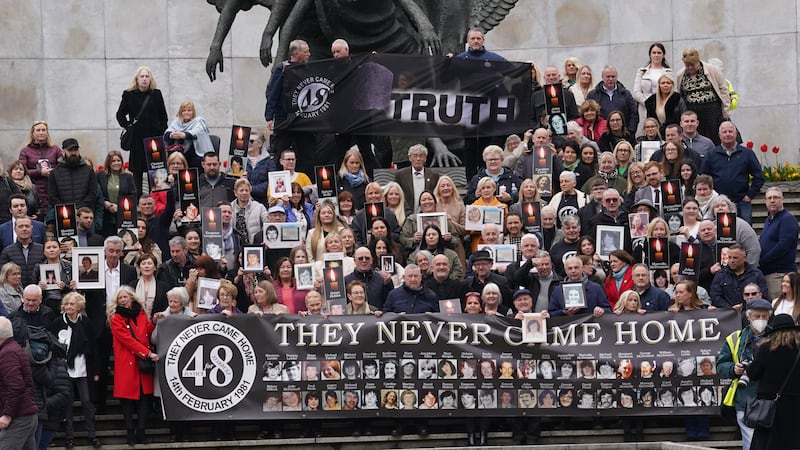THANKS to court judgements, France's burkini bans may be running into the sand - bad pun - but the damage is done.
Images will linger of armed police forcing a woman on the beach at Nice to take off a piece of clothing and at Cannes fining a woman for failure to wear "an outfit respecting good morals and secularism".
In Nice the nearest woman, bikini-clad, stares without expression as an outer garment comes off to show a loose top and trousers. The bikini-wearer is lightly tanned, the woman policed for burkini-wearing has darker skin. It would be nice to think the bikini-wearer showed sympathy as the police moved away, though no such thing was reported.
In Cannes, witnesses described nearby beachgoers shouting support for the police, and telling the fined woman "to go home" while her children sobbed. The Daily Mail, showing remarkable and uncharacteristic empathy for women, said her family had lived in France for three generations. "Today we are not allowed on the beach," the Mail quoted her. "Tomorrow, the street? Tomorrow, we'll be forbidden from practising our religion at all?"
Beyond the beaches, the series of extreme Islamist attacks and the backwash from Europe's refugee crisis have affected men as well as women, presumed Muslim because they speak a language the ignorant and monolingual think might be Arabic and/or because of their clothing.
The ludicrous, pathetic setting of burkini against bikini began as kneejerk playing to France's right-wing by the mayor in Nice, in the wave of fear and anger after that truck attack on the famous seafront. Spreading to other beaches, it briefly became a catch-all outpouring of anti-immigrant racism and Islamophobia.
The burkini controversy layered pretence to be defending women's rights over hostility to female autonomy. Some at least of those police enforcing the bans must have inwardly gasped at the nonsense of it. Bad enough that the strip of cloth and triangle that make up the classic bikini, once denounced as near-pornographic, should be portrayed as "an outfit respecting good morals and secularism". It was worse again to demonise a cover-up invented as protection from the sun in Australia, as well as suiting women who choose to cover themselves for religious reasons.
Would nuns strolling along French beaches be next? Orthodox Jewish men wearing skull-caps? Of course not. The burkini was banned as a possible `provocation exacerbating tensions' while France suffered Islamist extremist attacks. A piece of bulky female clothing now stood for terrorism, and could be attacked with communal approval - as the Brexit vote licensed and encouraged open racism in Britain, and a lot like the mood in Britain all of twenty-thirty years ago after IRA bombs, when to be Irish could mean having to make it clear, repeatedly, that Irishness did not equal support for the IRA.
Those years were hard on many, worst on the least well-off in least-secure work, living in tough estates, in jobs where solidarity melted in the face of outrage and grief. Police, prison officers, judges, parts of the media, all disgraced themselves. The entire Maguire family, caught up in the wrongful conviction of the Guildford Four, the families of the unjustly-convicted and jailed Birmingham Six, were only the most extreme examples.
Other than being forced out of work or home, maybe the worst pressure, because the most common, was a requirement - sometimes voiced, more often sensed - to show and tell how you hated the IRA.
Muslims across Europe complain of an obligation to denounce an organisation, attitudes, sometimes a whole belief system, that they never supported in the first place. The experience sets up powerful resentment, as it did decades ago. Some Irish in Britain then felt pressure to recast Irish/British history as a black and white tale - where British soldiers `held the ring' between warring tribes, and a murderous IRA had emerged, and was supported, only because people were afraid to oppose them.
Official British promotion of particular Muslim `leaders' and police/intelligence attempts to work through them produce splits, as did similar efforts decades ago among the Irish in Britain - and indeed, here. But did armed police demand that a fáinne or pioneer pin be removed from a lapel, to suggest as deluded an equation with `terrorism' as the burkini? (fifties B Specials and RUC? Ok, maybe.)
Did anyone become more anti-IRA because required to mouth public denunciation? Some admit that expectation pushed them towards armed republicanism. The only winners from France's August delusion are Isis. And given their attitudes to women, how weird is that.








